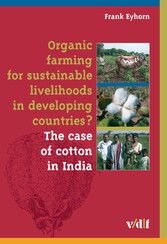Suchen und Finden
Organic farming for sustainable livelihoods in developing countries? - The case of cotton in India
Mehr zum Inhalt

Organic farming for sustainable livelihoods in developing countries? - The case of cotton in India
DOI 10.3218/3152-2: Organic farming for sustainable livelihoods in developing countries? The case of cotton in India
Organic farming has experienced considerable growth, not only in industrialized countries. Is it primarily an approach to safeguard consumer health and the environment, or can it also contribute to poverty reduction in developing countries? Drawing on 3 years of research on organic cotton farms in the Maikaal bioRe® project in central India, this book assesses the potential and the constraints of organic farming for improving rural livelihoods. It further integrates lessons learnt in other organic cotton projects in Asia and Africa, making it the presently most in-depth and comprehensive work on the socio-economic impact of organic farming in a developing country. The research builds on a conceptual frame that allows investigating rural livelihoods in a holistic and interdisciplinary way. The book not only addresses scientists in the fields of rural development and tropical farming systems, but also provides recommendations for practitioners and policy makers.
"Dr. Frank Eyhorn’s research on organic cotton grown in the central state of India is a pioneering work. It paves the way for the possibility of chemical-free, environment- and health-friendly sustainable farming, involving lower costs and yielding higher returns to the farmers. The model is capable of being replicated globally."
Sri Sompal, former Chairman of the ational Commission for Farmers and Minister of tate for Agriculture and Water Resources, India.
"That the organic production of cotton provides benefits not only for the environment and human health, but also for the socio-economic situation of farmers, is the main message of this well-documented comparative study of conventional and organic farming. It is a significant and motivating message for furthering the use of organic production methods in developing countries."Dr. Joan . Davis, Environmental Chemist, Eawag: wiss Federal Institute of Aquatic Sciences &, Technology.
The author
Frank Eyhorn specializes in utilizing organic farming for improving rural livelihoods in developing countries. He combines scientific knowledge with hands-on experience on farming systems, extension approaches, market development and policy frameworks. From 2000 to 2005 he coordinated organic farming projects in Asia at the Research Institute of Organic Farming FiBL (www.fibl.org). Since 2006 he is working as programme coordinator for Helvetas, a Swiss association for international cooperation (www.helvetas.org). Helvetas supports organic cotton projects in Burkina Faso, Mali, Senegal and Kyrgyzstan (see www.organiccotton.ch). This book is based on his PhD thesis written at the Centre for Postgraduate Studies on Developing Countries NADEL, Swiss Federal Institute of Technology (ETH), Zurich. Two previous books, the IFOAM Training Manual for Organic Agriculture in the Tropics and the Organic Cotton Crop Guide have become standard references for practitioners in tropical organic farming.
Alle Preise verstehen sich inklusive der gesetzlichen MwSt.











